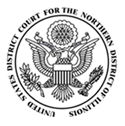Call-in information for telephonic hearings: If you have a telephonic hearing before the Court, please refer to the case docket and the most recent minute order to find the applicable phone number and access code.
Communications with Chambers for case related matters: The Court strongly prefers email communication with the courtroom deputy. If you have questions about a case assigned to Judge Jantz, please read through the procedures on this website before contacting the courtroom deputy. Additionally, if the parties resolve an issue that is scheduled for a hearing or that is otherwise under consideration by Judge Jantz by motion or otherwise, counsel should email the courtroom deputy as soon as possible. Opposing counsel must be copied on all emails. Counsel may jointly contact the Courtroom Deputy at Anthony_Squillante@ilnd.uscourts.gov
Communications with Chambers for non-case related matters: Please send an email to: Chambers_Jantz@ilnd.uscourts.gov
Settlement Correspondence: All settlement position statements should be sent to: Settlement_Correspondence_Jantz@ilnd.uscourts.gov
Proposed Orders: Any proposed order for which the parties have worked off a Court template, the parties should submit both a red-lined and clean version, so that the Court can efficiently review any requested changes from the template. All proposed orders should be sent to: Proposed_Order_Jantz@ilnd.uscourts.gov
Judge Jantz does not require courtesy copies of court filings. If a courtesy copy is required, the Court will request it from the parties.
All electronic filings (with the exception of exhibits) should be generated by “printing to PDF” from the original word processing file, so that the text of the digital document is searchable. PDFs created by scanning paper documents are not searchable. Therefore, the Court prefers that, if a party has the means to do so, PDFs that are created by scanning paper be OCRd so that they are also searchable.
Motions before Judge Jantz may not be noticed for presentment. Once a party electronically files a motion, the Court will notify the parties of the need, if any, for a hearing and/or a briefing schedule.
All motions must state with specificity when and how the movant complied with the meet and confer requirement of Local Rule 37.2 and the opposing party’s position (whether the motion is agreed to or opposed). This good faith effort to resolve or narrow the dispute should be done in person, telephonically, or through a video conferencing platform; the mere exchange of emails or letters will generally be insufficient to comply. Failure to comply with this rule risks summary denial of a motion


